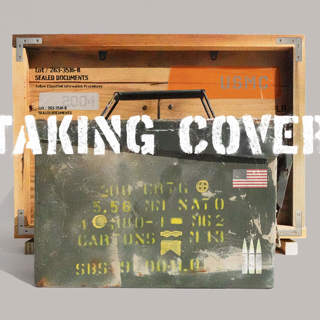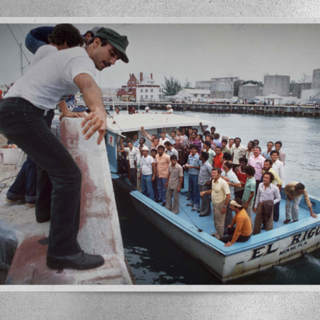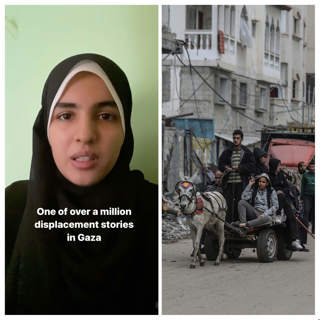
White Lies: The Excludables
In our final episode of the season, we start researching the names on the secret list of 2,746 Cuban excludables. What we find confirms many of our suspicions about the arbitrariness of how the U.S. government created the list. Our reporting takes us — where else? — to Cuba, to finally track down the men on the roof and hear them tell their own stories. What had they hoped to find in this country and what had they found instead? Finally, our journey takes us to one last interview in a high rise in Vancouver, Canada, where we hear from the man who led the uprising at Talladega, and made the decision to take to the prison's roof to display banners made from bedsheets that read, Pray for Us and Please Media: Justice, Freedom, or Death. Want to hear the first episode of Embedded's next series a week before everyone else? Sign up for Embedded+ at plus.npr.org/embedded.Learn more about sponsor message choices: podcastchoices.com/adchoicesNPR Privacy Policy
16 Maalis 20231h 4min

Introducing: Taking Cover
Hosted by NPR's Pentagon correspondent Tom Bowman and Graham Smith of the Investigations unit, Taking Cover isn't just a show about the worst Marine-on-Marine friendly fire incident in modern history. It's a story of betrayal, brotherhood, and what's owed—to families, the wounded, and to the American public—when we send our young to war. Coming soon, after this week's conclusion of White Lies.Learn more about sponsor message choices: podcastchoices.com/adchoicesNPR Privacy Policy
14 Maalis 20233min

White Lies: The List
Since we began reporting this story, we've been after a list. A secret list. On it are the names of 2,746 people whom the US government deemed excludable, including the men on the roof. The government has kept this list so secret that at one point it went so far as to classify it. None of the Mariel detainees knew if their name was on the list or not. In fact, nobody knew what names were on the list. Until now. In Episode 7, the story of a list that sparked uprisings, separated families, and changed the trajectory of U.S. immigration policy. And the story of what we learned when we finally got our hands on it. Want to hear the next episode of White Lies a week before everyone else? Sign up for Embedded+ at plus.npr.org/embedded.Learn more about sponsor message choices: podcastchoices.com/adchoicesNPR Privacy Policy
9 Maalis 202348min

White Lies: The Trial
In Episode 6, we sneak into the graveyard of the Atlanta federal penitentiary with a radical peace activist to learn more about what happened in the prison in late 1984. A peaceful protest by detainees held in the Atlanta pen resulted in a violent crackdown, and one of the detainees, a man named Jose Hernandez-Mesa, was charged in federal court with inciting a riot. We tell the story of his trial — and the surprising verdict that began reshaping public opinion about the Mariel Cubans who were being detained. Want to hear the next episode of White Lies a week before everyone else? Sign up for Embedded+ at plus.npr.org/embedded.Learn more about sponsor message choices: podcastchoices.com/adchoicesNPR Privacy Policy
2 Maalis 202341min

White Lies: The Pen
On May 18, 1980, a man named Genaro Soroa-Gonzalez arrived in Key West from the port of Mariel. With no family waiting to sponsor him, he was sent by plane to a resettlement camp at an army base. There he was interviewed by the INS and, a few days later, he boarded another plane, this one bound for the federal prison in Atlanta. But wait - he'd committed no crime, so why was the US government detaining him? And how long could they hold him? In Episode 5, the story of Genaro Soroa-Gonzalez and the beginning of the indefinite detention of Mariel Cubans. Want to hear the next episode of White Lies a week before everyone else? Sign up for Embedded+ at plus.npr.org/embedded.Learn more about sponsor message choices: podcastchoices.com/adchoicesNPR Privacy Policy
23 Helmi 202343min

White Lies: The Entry Fiction
When President Carter promised to welcome the men and women arriving on the Mariel boatlift with "an open heart and open arms," he had referred to them as refugees. But technically speaking, they weren't refugees. They were classified as entrants, an immigration status with a peculiar legal standing in the United States. While entrants are physically allowed to enter the country, legally they're still at the border, asking to come in. Their presence in the country is known as a legal fiction — specifically, the "entry fiction." So even as Cubans were disembarking boats in droves through the summer of 1980, they were officially still floating off the coast of Key West. And this immigration status followed them to where they went next: an army base in rural Arkansas. In episode 4, the curious case of the militarized border in the middle of the Ozark Mountains. Want to hear the next episode of White Lies a week before everyone else? Sign up for Embedded+ at plus.npr.org/embedded.Learn more about sponsor message choices: podcastchoices.com/adchoicesNPR Privacy Policy
16 Helmi 202355min

White Lies: The Rumors
During our reporting, we heard one story over and over again: that Fidel Castro had emptied his prisons to fill the boatlift. It's a story that's been told so often and with such conviction that of course it must be true, right? But what if this was more theater than history? What was happening in 1980 in Miami and throughout the country that made this story so compelling? Why did it feel so true to so many people? In Episode 3, we go to Miami to find out. Want to hear the next episode of White Lies a week before everyone else? Sign up for Embedded+ at plus.npr.org/embedded.Learn more about sponsor message choices: podcastchoices.com/adchoicesNPR Privacy Policy
9 Helmi 202351min

White Lies: The Boatlift
Note: Due to a technical error, some listeners did not hear the correct audio for Episode 2. We are re-publishing it with the corrected audio. The story of the men on the roof didn't start with that prison takeover in 1991. It didn't start when they were detained in federal prisons. And it didn't start when the government made a secret list of their names in 1984. Instead, it started in the spring of 1980, with one of the largest refugee crises in American history: the Mariel Boatlift. Want to hear the next episode of White Lies a week before everyone else? Sign up for Embedded+ at plus.npr.org/embedded.Learn more about sponsor message choices: podcastchoices.com/adchoicesNPR Privacy Policy
2 Helmi 202349min






















